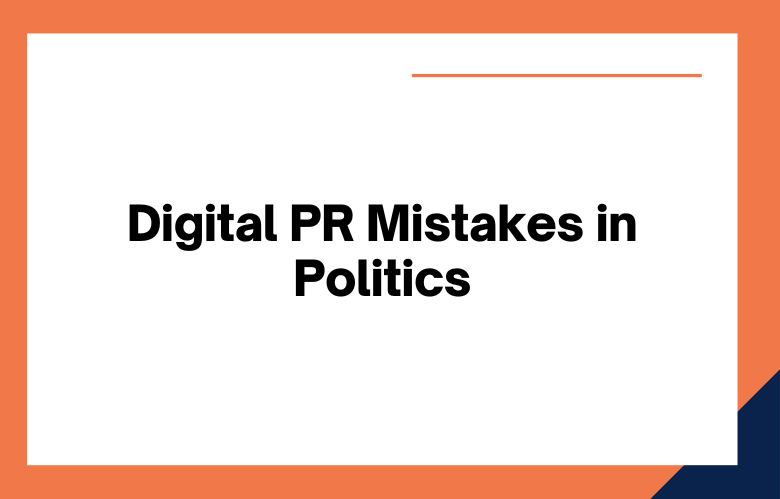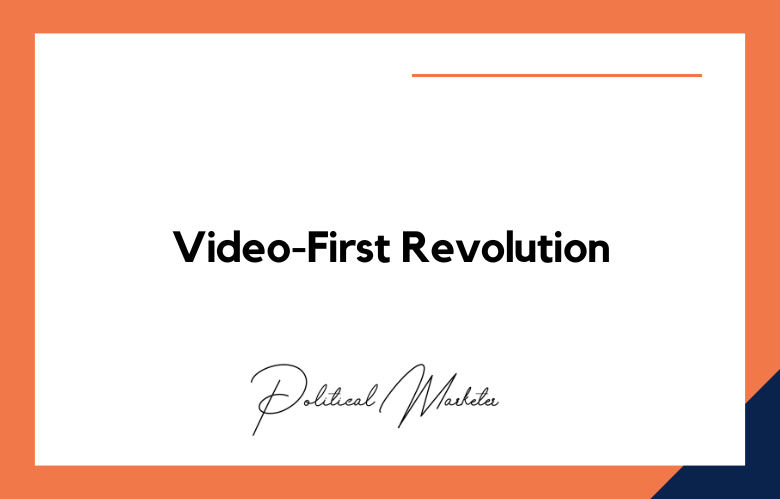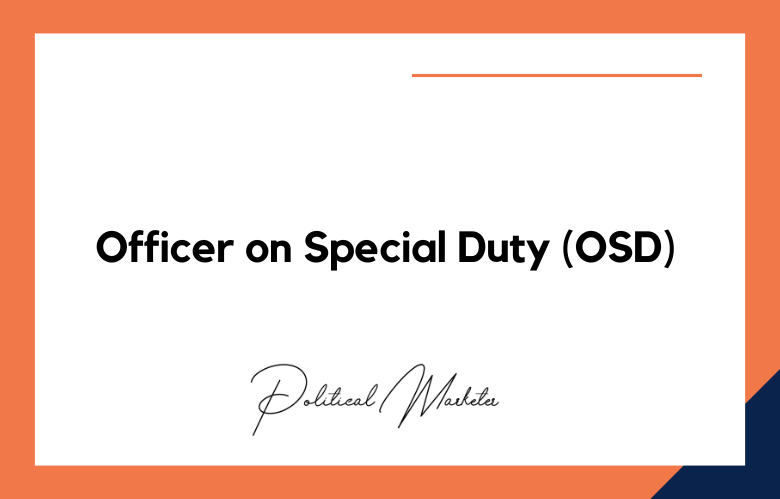Politics is all about credibility. If you don’t have it, you can’t get very far. Unfortunately, many political leaders make digital PR mistakes that destroy their credibility. We’ll discuss the three biggest PR blunders and how to avoid them. In the digital age, it’s more important than ever for political leaders to have a solid online presence. However, many mistakes can be made that can damage their credibility and reputation. We’ll discuss three of political leaders’ most common digital PR mistakes.
We’ll also offer advice on how to avoid these mistakes to ensure your online reputation remains strong.
In this digital age, it’s more important than ever for political leaders to be aware of the mistakes they make online.
A single tweet or Facebook post can impact a career and even destroy credibility that’s taken years to build.
Here are common digital PR mistakes that political leaders must avoid.
Digital PR Mistakes That Will Destroy Political Leaders’ Credibility
- Failing to respond to negative comments and criticism online
- Posting inflammatory or offensive content
- Ignoring the needs of social media followers
- Making inaccurate statements
- Allowing bots and fake accounts to post on behalf of the leader
- Not using social media for its intended purpose
- Overspending on digital marketing campaigns
- Not tracking results
- Failing to respond to negative comments and criticism on social media
- Posting inflammatory or offensive content
- Deleting critical comments from social media
- Ignoring essential news stories and scandals
- Making inaccurate statements
- Allowing bots and trolls to control the conversation online
- Not using social media for outreach purposes
- Failing to create a solid social media presence
- Failing to respond to negative comments and criticism on social media
- Posting inflammatory or offensive content
- Deleting critical comments from social media accounts
- Refusing to engage with the public or answer questions
- Ignoring online trends and current events
- Making spelling and grammatical errors in official statements
- Excessive self-promotion on social media channels
- Allowing bots and trolls to control the conversation
- Failing to respond to negative press in a timely and effective manner
- Sending out press releases without checking for accuracy
- Not being active on social media
- Making too many mistakes when communicating with the public
- Acting entitled and expecting the public to trust them blindly
- Posting offensive or inflammatory content online
- Overspending on digital marketing campaigns
- Failing to respond to negative comments and criticism on social media
- Ignoring the concerns of citizens
- Posting too much about themselves and not enough about what they’re doing for their constituents
- Making promises, they can’t keep
- Being dishonest or secretive with the public
- Refusing to answer questions from reporters or members of the public
- Acting like a dictator instead of a leader
- Allowing scandals to occur under their watch
- Not being responsive on social media
- Failing to create valuable content
- Ignoring negative comments and feedback
- Posting too much or too little content
- Being inconsistent with branding
- Reacting emotionally to negative news stories
- Not utilizing a social media management tool
- Automating posts without taking the time to personalize them
- Failing to respond to negative comments or criticism on social media
- Posting inflammatory or offensive content
- Deleting critical comments from social media pages
- Making false statements or claims
- Ignoring the concerns of citizens
- Allowing bots and fake accounts to post content on social media
- Misuse of personal data collected from citizens
- Using social media for propaganda purposes
- Failing to respond to negative comments and criticisms promptly
- Posting too much content (especially self-promoting content) that is irrelevant to the public
- Ignoring or deleting critical comments from followers
- Making spelling and grammatical errors in social media posts
- Sending automated messages instead of personal responses
- Not using social media effectively- not posting enough, not responding to followers, etc.
- Oversharing personal information (location, political views, etc.) on social media
- Allowing bots and fake accounts to post on their behalf
- Failing to Respond Quickly to Negative Comments
- Sending Out Inappropriate or Tone-Deaf Tweets
- Making False Claims
- Refusing to Cooperate with the Press
- Allowing Staffers to act up Online
- Ignoring Social Media Trends
- Overloading Constituents With Email Blasts
- Not Having a Robust Digital Strategy
- Not monitoring their social media presence
- Tweeting without thinking
- Posting inflammatory content
- Failing to respond to negative comments and criticism
- Ignoring digital etiquette
- Being too promotional or self-promoting
- Oversharing personal information
- Allowing bots and trolls to run rampant on their social media accounts
- Failing to respond to negative comments and criticisms on social media
- Posting inflammatory or offensive content
- Making false statements or claims
- Ignoring the needs of constituents
- Allowing bots and trolls to control the conversation online
- Not being transparent with digital communications
- Overspending on digital marketing campaigns
- Underperforming on digital platforms
- Not monitoring their online presence
- Failing to respond to negative comments and criticism
- Posting inflammatory or offensive content
- Making inaccurate statements
- Allowing bots and trolls to post on their behalf
- Ignoring basic security measures
- Not being transparent about how they collect and use data
- Relying too heavily on social media for communication
- Failing to respond to negative comments and criticisms on social media
- Posting inflammatory or offensive content
- Ignoring essential news stories and controversies
- Making misleading statements or claims
- Oversharing personal information
- Not being transparent with the public
- Allowing bots and trolls to run rampant on social media platforms
- Refusing to engage with the press
- Failing to respond to negative comments and criticism on social media
- Posting inflammatory or offensive content
- Deleting critical comments from social media posts
- Issuing press releases without checking for accuracy
- Sending out unprofessional emails to reporters and members of the public
- Making inaccurate statements to the press
- Not being available for interviews when needed
- Refusing to take responsibility for mistakes
- Failing to keep up with the news and current events
- Posting too much about themselves and not enough about what they’re doing for their constituents
- Not responding to criticism on time
- Deleting negative comments from their social media pages
- Making inaccurate statements or claims that can be easily disproven
- Tweeting or posting without proofreading first
- Being inconsistent with their messaging
- Allowing bots and trolls to post on their behalf
- Failing to respond to negative comments and criticism on social media
- Posting too much about themselves and not enough about what they’re doing for their constituents
- Ignoring the fact that social media is public and anyone can see everything you post
- Being defensive when someone points out a mistake or criticizes them
- Not using social media to connect with voters and constituents
- Focusing only on promoting themselves and not engaging with others in a meaningful way
- Posting inflammatory or partisan content that will turn off potential supporters
- Oversharing personal details that no one cares about
- Failing to respond to negative comments or criticism on social media
- Posting inflammatory or offensive content
- Deleting critical comments from social media pages
- Ignoring advice from digital PR experts
- Failing to create a social media strategy
- Not using social media to connect with voters
- Not monitoring analytics
Conclusion
Digital PR mistakes can have a significant and often long-lasting impact on the credibility of political leaders. If you want to prevent these blunders from happening to your campaign or organization, contact us for help.
We have a successful team with years of experience crafting and executing successful digital PR strategies for clients in various industries.
Please help us know what it takes to make your voice heard online; we are available here to work for you.
Digital PR Mistakes That will Destroy Political Leaders’ Credibility: FAQs
What Is Digital PR For Political Leaders?
Digital PR is the strategic use of online media, influencer engagement, content distribution, and search visibility to shape a political leader’s image and narrative.
Why Is Digital PR Important In Modern Politics?
It helps build a positive public image, counters misinformation, increases visibility, and connects leaders directly with voters through digital platforms.
What Happens When A Political Leader Ignores Digital PR?
Ignoring digital PR can result in loss of narrative control, unchecked negative press, reduced voter engagement, and poor online visibility.
Why Is Inconsistent Messaging A Digital PR Mistake?
Inconsistent messaging confuses the public, dilutes brand identity, and weakens trust in the leader’s communication and intent.
How Can Poor Crisis Management Damage A Leader’s Online Image?
Failure to respond promptly or transparently during a crisis can lead to viral backlash, eroded credibility, and long-term damage to reputation.
What Is The Risk Of Overusing Social Media Without Strategy?
Excessive or unplanned posting can lead to message fatigue, reduced engagement, or unintentional controversy that derails the campaign’s narrative.
Why Should Leaders Avoid Relying Only On Legacy Media?
Exclusively using legacy media limits reach, ignores younger digital-native voters, and increases vulnerability to one-sided or biased coverage.
How Does Lack Of Transparency Impact Digital Trust?
Voters expect honesty. Concealing facts or avoiding accountability online breeds skepticism and can quickly spiral into a digital credibility crisis.
What Role Does SEO Play In Political Digital PR?
SEO ensures that positive or official content ranks higher in search results, helping suppress negative stories and improve discoverability.
Why Is Ignoring Influencers A Missed Opportunity?
Influencers can amplify messages organically, reach niche voter segments, and lend credibility, especially among youth and urban voters.
How Can Inauthentic Content Backfire?
Scripted or insincere content disconnects with the public, reduces relatability, and can lead to ridicule or distrust online.
Why Is Lack Of Engagement On Social Media A Problem?
Broadcasting without listening makes leaders appear distant. Lack of engagement prevents feedback, alienates followers, and misses real-time insights.
What Is The Danger Of Not Monitoring Online Sentiment?
Unmonitored sentiment can allow misinformation to spread, delay response to crises, and result in missed opportunities to connect or course-correct.
How Does Delayed Response Hurt In The Digital Era?
In today’s 24/7 news cycle, delayed responses seem evasive. Fast and clear replies are essential to contain damage and show leadership.
Why Is Ignoring Regional Language Content A Mistake?
Neglecting regional languages limits outreach in diverse electorates, especially in rural or vernacular-speaking communities.
What Are The Risks Of Overpromising In Online Campaigns?
Unrealistic digital promises can lead to backlash, meme attacks, or voter disillusionment when promises go unfulfilled or lack substance.
Why Should Leaders Not Underestimate Digital Satire Or Memes?
Memes can rapidly shape public perception. Ignoring or mishandling them may result in loss of control over a leader’s image.
What Happens When Political Leaders Avoid Owned Platforms?
Without websites or official channels, leaders lose control over message framing and rely too much on third-party platforms.
How Can Ignoring Analytics Affect Digital Strategy?
Without data insights, campaigns cannot track performance, optimize content, or identify what’s resonating with voters in real time.
What Is The Impact Of Not Having A Digital War Room?
Without a dedicated team monitoring online chatter and trends, leaders risk slow reactions, missed threats, and poor campaign agility.
One way to get in touch is by filling out our online form on this site or give us a call at
+91 9848321284. Let’s work together today!











